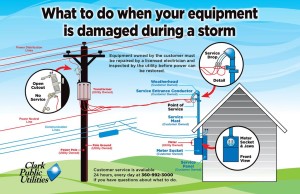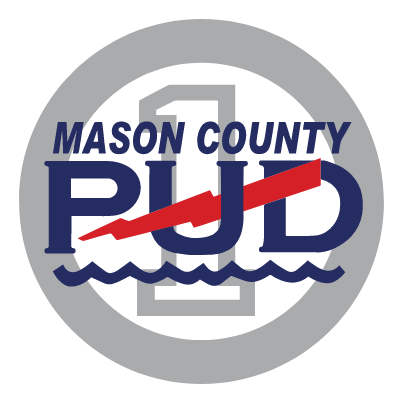Outages are unpleasant, inconvenient and occur anytime of the year, for any number of reasons. If you plan ahead and always keep emergency items on hand, it is much easier to endure. Your outage kit should include:
- Clean drinking water
- Canned/packed food
- Blankets
- Flashlight with fresh batteries
- Emergency phone numbers
- Candles and matches (never leave unattended)
- Oil lamps and oil (never leave unattended)
- Barbecue for outside cooking (never leave unattended and never use to heat the inside of your house, as it causes the house to fill up with carbon monoxide).
For more information visit:

During power outages, many problems may prevent power from reaching customers, especially during storms. Here’s how we prioritize our repairs during an outage:
TOP PRIORITY- Hazardous situations threatening public safety
1) Transmission lines, which deliver power to substations
2) Substations that distribute power to several thousand customers
3) Feeder lines from substations which affect large numbers of customers
4) Primary lines which serve between five and 30 customers
5) Outages affecting individual customers
Why We Check the Whole System
In an electric system, high voltage power travels from a source, such as a Columbia River dam, over a regional transmission system to utility substations. From there it runs through a series of feeder lines that connect with primary lines serving individual customers. Transformers along the way lower the voltage for safe use in our homes and businesses.
Problems can occur at any stage of transmission. If there is damage to both the substation and primary line delivering power to your home, fixing the primary line first won’t do any good, because damage at the higher level will prevent power from reaching your neighborhood. That’s why we start at the top of the system and work our way down.
Frequently Asked Outage Questions
Why do I have trouble getting a call through to your office during an outage?
The PUD’s phone system can only handle a set number of calls at once, however CRC, our answering service can handle hundreds of calls per minute and have three call centers in the United States- Texas, Minnesota and Tennessee. Calls that go through the PUD’s local number might get bogged down, but the 800 number is forwarded directly to CRC.
Why can’t you tell me when my power will be restored?
Unless the cause of an outage is obvious (example: when a car runs into a power pole), we don’t know how long it will take to learn the source and extent of the damage. During winter storms that result in numerous outages, it’s even harder to estimate damage and repair time, and we don’t want to give you false expectations.
 My neighbors have power—why don’t I?
My neighbors have power—why don’t I?
There may be a blown fuse in a transformer or damage to the line serving your home. We may also need to isolate a small section of line to work on a problem, even while power is restored to other parts of the same line.
The diagram on the right shows which equipment belongs to the utility and which is the customer’s responsibility.
Click on the image to see a larger version.
Do certain customers get their power restored first after an outage?
No. We start with the biggest problems and work our way down. However, we do make special efforts to respond quickly to the needs of emergency service providers, such as police, fire stations and hospitals.
Why does it take so many hours, sometimes days, to get power back?
During major outages that affect many areas of the county, we have to resolve all the problems methodically and safely. The time it takes to repair problems is directly related to the extent of the damage.
Our crews work around the clock until all service is restored.
If you or someone in your home is on life support, please make sure the PUD has your phone number and the type of life support you require. We will attempt to notify you when we are having a planned outage, so you can make arrangements. In the event the power goes out due to a storm or other unknown problem, we will attempt to do our best to get your power back on as quickly as possible.
When we have an outage, our staff notifies the crew that we have a life support situation. We will try to contact you with as much information as we have available to keep you informed of the possible time involved to repair the problem.
You should have some sort of emergency back-up system if the power does go out. If you do not have enough back up to keep your equipment running, please call 911 before the situation becomes too serious.
Yes. In order to provide power and/or water services, we must have access to your meter and to the PUD’s point of delivery.
Please remember that the meter readers and service workers need access to the equipment, either to take a reading, repair, upgrade, remove, or replace defective equipment. If you have a locked gate to your property, we will work with you to get a lock that will allow us access.
Please keep the area around our equipment clean and cleared of brush or other obstructive material. We cannot provide you with utility services if we cannot read your meter. Please be considerate and provide a safe, unobstructed access to the meter. If you have a locked gate or a dog that may pose a threat to a meter reader, please contact us at 360-877-5249 or 1-800-544-4223 between 8:00 a.m. and 4:30 p.m., Monday through Friday.
Our employees should not ask to go inside your home. This only occurs on very rare occasions when we have to assist a homeowner with shutting off breakers or water in an emergency situation.
If a person comes to your door claiming to be a PUD employee, don’t let him or her inside without first asking for identification. Our employees carry ID cards with their picture on it and will gladly show it to you. All of our vehicles are marked with the PUD logo. If you are not sure of the person at your door, please call our office and we will verify that the person is our employee.
Additionally, we will never demand payment via gift card or other alternative currency to avoid disconnect. We contact you multiple times via phone and mail prior to disconnection. If you ever suspect it’s not a PUD 1 employee contacting you, please hang up and call the office directly to be sure.
A generator is useful in the event of a prolonged power outage, although improper use presents a deadly safety hazard. Portable generators are intended to serve as a power source for just a few lights or appliances during an extended outage.
A generator plugged into your electric system without professional installation can back feed electricity into the PUD’s system and energize dead lines with high voltage. This could result in serious injury or death for electrical line workers who think the lines are dead.
Plug appliances directly into the generator. Do not plug the generator into a wall outlet or electrical circuit. The total electric load on your generator must not exceed the manufacturer’s rating. Please be cautious and follow the manufactures suggestions when using a generator.
If you have purchased a portable generator for the storm season, please follow these important safety rules.
- Before installing your new generator be sure to read all the instructions and safety material from the manufacturer.
- Make sure the generator is installed properly. Improper installation or operation can cause severe injury or result in death.
- If you connect appliances to your portable generator, use an appropriately sized extension cord in good condition. If an extension cord is the wrong size or in poor condition, it could become a fire hazard.
- If you want your generator connected to your home electrical system, call a professional. Proper disconnect switches must be installed and you must use them to isolate your home from our power grid. If switches are not connected properly, a back
feed of electricity can occur to our distribution lines and possibly injure or result in death of a line worker.
- Keep the portable generator outside or in a well ventilated garage. Store fuels safely and keep them away from children. Improper ventilation and storage of your generator or fuel could cause carbon monoxide poisoning.
- To have a safe storm season, follow these simple rules if you have a portable generator.
We measure water in cubic feet because it is the standard measurement in our industry. If you want to figure out your water use in gallons, it is easy. One cubic foot equals 7.48 gallons, so just take the number of cubic feet listed on your bill and multiply it by 7.48 to get your use in gallons.
We will repair any leaks in the portion of the water system we own, which in most cases ends at your side of the water meter that connects your home to our main water line. The service line to your home, as well as the plumbing in your home, is your responsibility. We will certainly help you diagnose a mysterious leak in your system and answer any questions you might have about how to get it fixed.



